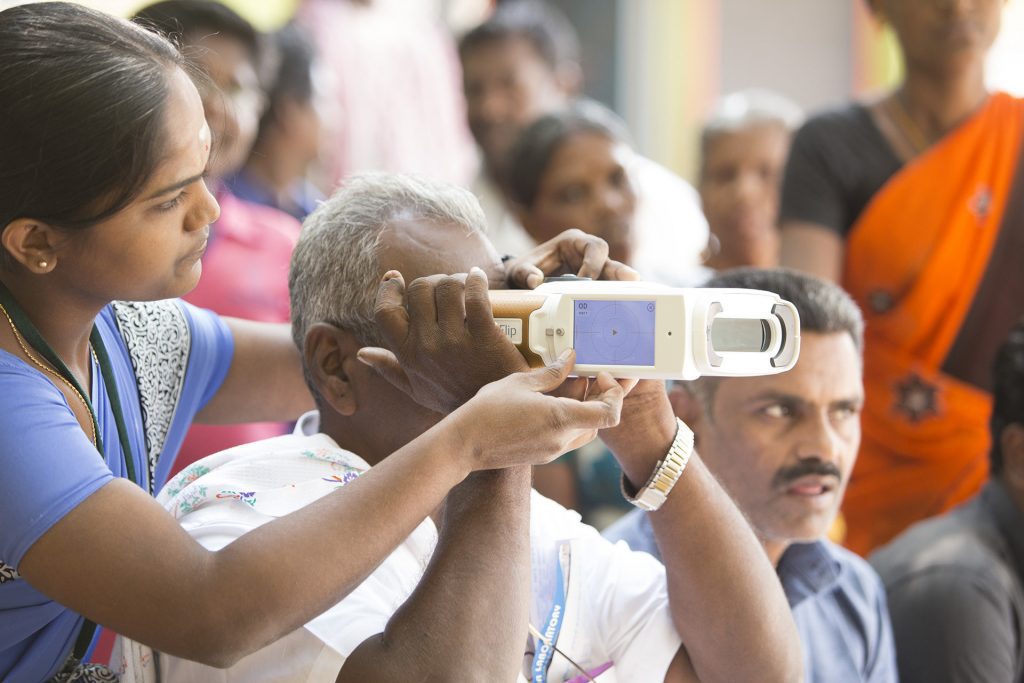PlenOptika notes a new paper published by researchers at the Aravind Eye Institute in India, Johns Hopkins University, and the Massachusetts Eye and Ear Institute found that eyeglasses made from QuickSee handheld autorefractor measurements were accepted equally to those made from subjective refraction measurements.
About the study
The study authors suggest that QuickSee, due to its accuracy and portability, could be used to radically expand access to eyeglasses in remote and low resource settings which lack professionals and clinical equipment to provide accurate prescriptions.
The paper in Ophthalmology, “Investigation of the accuracy of a low-cost, portable, autorefractor to provide well-tolerated eyeglass prescriptions: a randomized crossover trial,” concluded that patients accepted eyeglasses made from QuickSee measurements equally to those made from subjective refraction. PlenOptika, the maker of QuickSee, assisted in study design but its execution, analysis, and reporting were independent of the company.
Uncorrected refractive error is a matter of major global concern, including wealthy nations. A report published by The Lancet in February 2021, “The Lancet Global Health Commission on Global Eye Health: vision beyond 2020,” estimated that over 1 billion people worldwide had distance- or near-vision impairment, resulting in at least $410 billion in productivity loss annually. The authors also highlighted the impact of poor vision on quality of life, education, and workforce opportunities, noting that vision correction would support a number of the UN’s Sustainable Development Goals. This is the challenge PlenOptika set out to solve.
“These encouraging findings support our belief that the global burden of vision impairment can be met with innovative technology, not only in low- and middle-income countries, but also in wealthy countries like the US where vision care disparities persist,” said Shivang Dave, PhD, CEO of PlenOptika and one of QuickSee’s inventors. He and his colleagues in PlenOptika, Daryl Lim, PhD, Eduardo Lage, PhD, and Nicholas Durr, PhD, invented the technology while researchers at the Massachusetts Institute of Technology, in collaboration with the Regional Government of Madrid. QuickSee development was supported in part by grants from the National Eye Institute of the National Institutes of Health.
In wealthy nations where patients have access to licensed health care providers, QuickSee’s technology has also helped eye doctors provide on-site care, such as in nursing homes, correctional facilities, and community health centers. Even large eye health centers are using QuickSee to manage large patient volumes efficiently.
Lage, PlenOptika’s Chief Technology Officer, noted that impact in global health was QuickSee’s central design objective. “Portable, durable, easy to use, and affordable, all without sacrificing clinical quality, that was our mission,” he said. “It is gratifying that independent research affirms QuickSee’s capability to achieve this.”
To date, QuickSee has been used to measure over three million people in 45 countries, and was found in prior peer-reviewed studies to produce measurements that strongly agree with subjective refraction.
“Our goal with QuickSee is nothing short of making accurate autorefraction accessible to everyone, everywhere, enhancing their opportunities and enabling the wonder of clear vision,” said Dave. “We hope this research gives vision care professionals, healthcare organizations, and NGOs the confidence that QuickSee will be instrumental in their work to dramatically increase access to vision correction.”
